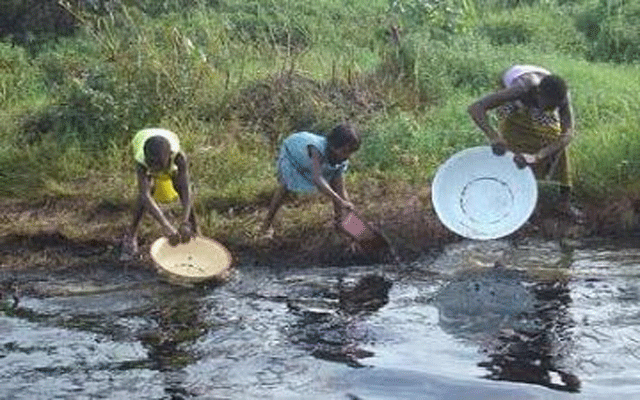“What would you do if someone dumped nine Olympic swimming pools of oil into your community?”
This is the question that is splayed across Amnesty International’s webpage on the Niger Delta oil spills. As it turns out, since 2011, Shell alone has reported 1,010 spills, with 110,535 barrels or 17.5 million litres dumped into water bodies in the Niger Delta—a conservative number, as the Nigerian government and other experts have estimated it to be even more. As this data is from 2018, the numbers do not consider the spills that have occurred since then or before then, including the infamous Ogoniland spills.
Ironically, on Earth Day this year, April 22, the tabloids carried stories of the finalisation of the Joint Investigative report of the Shell-owned Okordia-Rumuekpe 14-inch trunk line which had spilled 213 barrels- over 33, 000 liters- of crude oil on April 7 into the Ikarama community. According to the report, the spill had polluted 1.34 hectares of land, at least two football fields, and negatively impacted nearby palm trees and fish ponds.
READ: FG explains why it revoked 4 Addax Petroleum Oil Mining Licenses
One cannot keep count of what number the Ikarama spill will take up on the list of spills that have been attributed to Shell. The Bodo oil spills of 2008 and 2009 which forever devastated the Bodo community and surrounding communities are just two examples of major spills by the Anglo-Dutch oil company. According to the Guardian, experts who studied video footage of the spills at Bodo say they could together be as large as the 1989 Exxon Valdez disaster in Alaska, when 10 million gallons of oil destroyed the remote coastline.
Only two months ago, a UK Supreme Court ruled that a group of Nigerian farmers could sue Shell’s parent company for the oil spill in the Ogale and Bille communities, upon a suit that had been brought for decades of oil spills and environmental pollution in those communities by Shell.
READ: Lawmakers want Oil firm investigated for flouting local content laws
With a plethora of laws and regulations in Nigeria, it is inconceivable how big oil companies continue to pollute the Niger Delta with impunity. Section 17(4) of the Oil Pipelines Act also provides that “Every licence shall be subject to the provisions contained in this Act as in force at the date of its grant and to such regulations concerning…the prevention of pollution of such land or any waters.” Regulation 25 of the Petroleum Drilling and Production Regulations provides that “The licensee or lessee shall adopt all practicable precautions, including the provision of up-to-date equipment approved by the Director of Petroleum Resources, to prevent the pollution of inland waters, rivers, watercourses, the territorial waters of Nigeria.”
The NOSDRA Act equally sets up the National Oil Spill Detection and Response Agency (NOSDRA) and gives it the responsibility of ensuring compliance with environmental legislation like the Environmental Guidelines and Standards for the Petroleum Industry in Nigeria (EGASPIN). There also exists the Guidelines and Procedure for the Construction, Operation and Maintenance of Oil and Gas Pipelines that sets standards for construction and maintenance of pipelines.
READ: Why President Buhari overruled DPR and restored 4 oil blocks to NNPC/Addax
With extensive provisions under these statutes and regulations governing environmental standards in the Nigerian oil and gas industry, why do these spills continue, both from drilling and production platforms and from pipelines? It turns out that while Shell has continued to blame many of these spills on sabotage, the Ikarama spill has been shown by the investigation to undoubtedly be due to failure of the integrity of the pipeline.
While the company continues to pollute communities, its CEO, Ben van Beurden, announced in April last year, perhaps in a bid to align with popular climate culture, that “We aim to be a net-zero emissions energy business by 2050 or sooner.” How does a company aiming for net-zero continue to operate with such low standards as routinely spill hundreds of barrels of oil in 2021? For how long will Shell devastate Niger Delta communities?
Colin Roche of Friends of Earth, Europe has expressed to Amnesty International that “While oil companies like Shell spend millions greenwashing their images, tens of thousands of people continue to suffer from their pollution and negligence.”
READ: NNPC extends crude oil swap contracts by 6 months
The regulators of the Nigerian oil and gas industry must sit up. NOSDRA in particular has to step up to the plate to carry out its duty under law to ensure environmental laws are complied with and spills like these are entirely prevented—and when they occur, they are promptly cleaned up.
The DPR should do more than seek to collect licence and bonus fees from sector participants and take a hard stance on standards within the industry. The Niger Delta has endured enough from the ill effects of oil exploration, and the country risks a resurgence of heightened restiveness in the area if things continue this way. Companies like Shell need to know that the laws work and will clamp down on them when violations occur.











